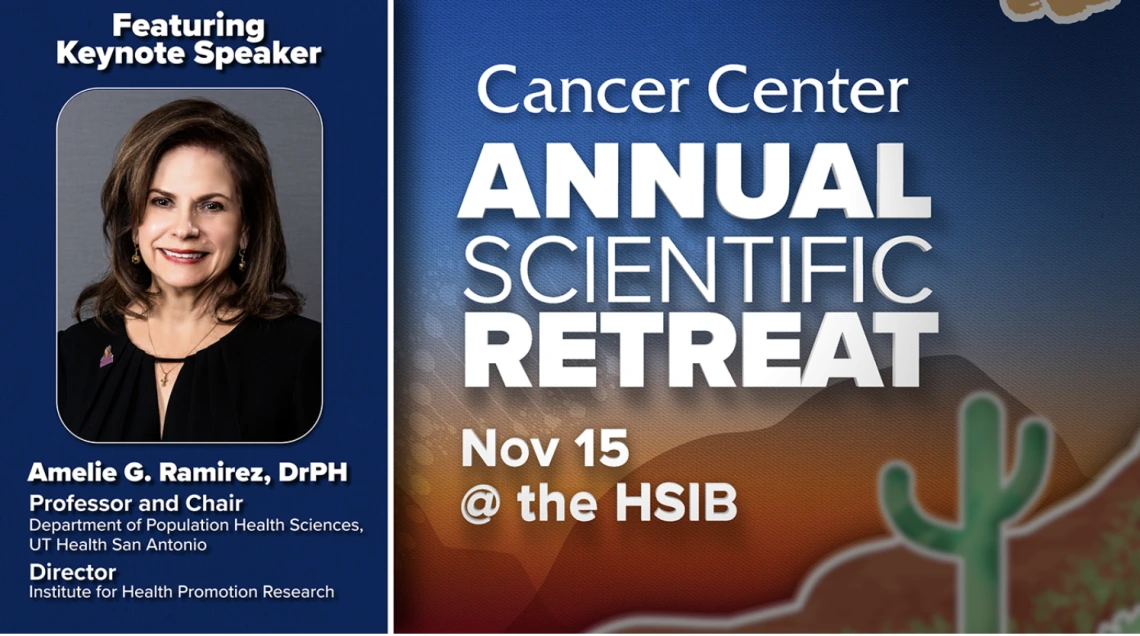Education is key to early detection and prevention among patients for scientific retreat speaker

Amelie Ramirez, DrPH, MPH, is a trailblazer in health equity for Latino cancer. Elected to the National Academy of Medicine in 2007, she was named a Champion of Change by the White House in 2011.
The scientific retreat keynote speaker at the Annual Scientific Retreat on November 15 has spent more than 35 years specializing in population health, prevention and screening, and health promotion and communication in issues of obesity, cancer, tobacco, nutrition, physical activity, and more among Latino and underserved populations.
“Our Latino population is not surviving cancer as well as other population groups, but it's because they didn't come in early,” she said. “We think we're doing a good job in getting the message out, but maybe we're not using the best culturally adapted approaches to convince our population that this is important for them, too. It's just not a message for the larger population, but it's a message directed to them.”
Ramirez is chair and a professor in the Department of Population Health Sciences at UT Health San Antonio, a Hispanic-serving institute, and the director of the Institute for Health Promotion Research and associate director of Cancer Outreach and Engagement at Mays Cancer Center.
She also has personally trained and mentored more than 300 Latino undergraduate and pre- and post-doctoral students, as well as early-career faculty members, in research design, methods, data analysis, and career development.
Ramirez is also the director of Salud America! a national program base at the Institute for Health Promotion Research at UT Health San Antonio. The program uses innovative, evidence-based research and communications to educate and activate an online network of more than 300,000 advocates to promote healthy change and equity for Latino and all families.
“Through Salud, America! we are trying to amplify the voice of our community and develop educational material,” she said. “There are tool kits that other communities can adapt. We're not saying you have to replicate it exactly, but they can be adapted to work in your community to bring these issues forward.”
Ramirez has personal motivation for promoting early detection and prevention.
“I lost my dad to liver cancer. He didn't smoke, he didn't drink, he was a hard worker. His cancer was diagnosed pretty late, and it was at a stage that they really couldn't do much,” she said. “It was more of a kind of a maintenance treatment that he had, and it was really heart wrenching.”
The importance of education in communities
She sees education as a vital component in transforming health care systems to improve the lives of us, Latinos and Native Americans and other underserved populations, which is why funding for educational program is important in studies, especially in developing an understanding of the importance of screening.
“We need to sustain outreach and education programs that really inform our public about what they can do to reduce their risk factors,” Ramirez said. “For example, obesity is really soaring in these population groups, and we need to do a better job of letting them know that they're increasing their risk for cancer. This is why it's not just that we think they need to be thinner. It's there's a direct link, and it causes inflammation in the body. Inflammation can lead to cancer.”
What she sees is as one of the most important ways to prevent cancer is through screening. She is an advocate for improved insurance coverage, particularly Medicaid, to enhance access to healthcare services to allow for screening and early detection.
“Screening for early cancer detection is, simple, right? But people are concerned that it will lead to death,” she said. “That's where we just need to change the mindset and detect early.”



